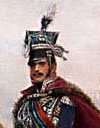... an inspection of the Russian left revealed its comparative weakness, and that the way was open to an outflanking attack plain for all to see. Marshal Davout was particularly insistent that this was the movement to undertake. He repeatedly begged Napoleon to send 40,000 men forward overnight so that they could move round the open Russian flank and place themselves in Kutusov's rear by 8:00 A.M. the next morning. Such a move, he assured the Emperor, would leave the Russians with no recourse but precipitate withdrawal into the angle formed by the Moskva and Kalatsha rivers, where they would be completely at their opponent's mercy. From the first, however, Napoleon set his face against any such strategical movement. "Ah, you are always for turning the enemy," he remarked to the Prince of Auerstadt. "It is too dangerous a maneuver!"
A number of apparently irrefutable reasons led him to the decision. In the first place, the numerical strength of the Grande Armee was too small to permit the mounting of a full scale manoeuvre sur les derrieres; the approximate parity of the contesting forces would make the detachment of a large force, even if for only a temporary period, extremely foolhardy. Then again, the condition of both the artillery and cavalry arms was giving cause for anxiety; the horses, in particular, were in very poor fettle. Napoleon also knew that his troops were hungry and homesick for France, and that most of them had long ago given up any genuine interest in the campaign, other than simple survival. Above all, he feared that the Russians would withdraw from their position overnight if the least indication of a strategic envelopment reached them; they had successfully avoided battle several times already since June 22, and Napoleon had no desire to see a repetition of these Fabian tactics. Lastly, he had reason to doubt that the Russians would be unduly worried if a French force suddenly appeared in their rear. His studies of the campaigns of Frederick the Great had convinced him that Russian armies were not particularly sensitive about their communications when it came to the actual fighting of a full-scale battle; Frederick's experiences at both Zorndorf and Kunersdorf were particularly relevant in this context.
~D. Chandler, The Campaigns of Napoleon, p. 797-798
























































No comments:
Post a Comment